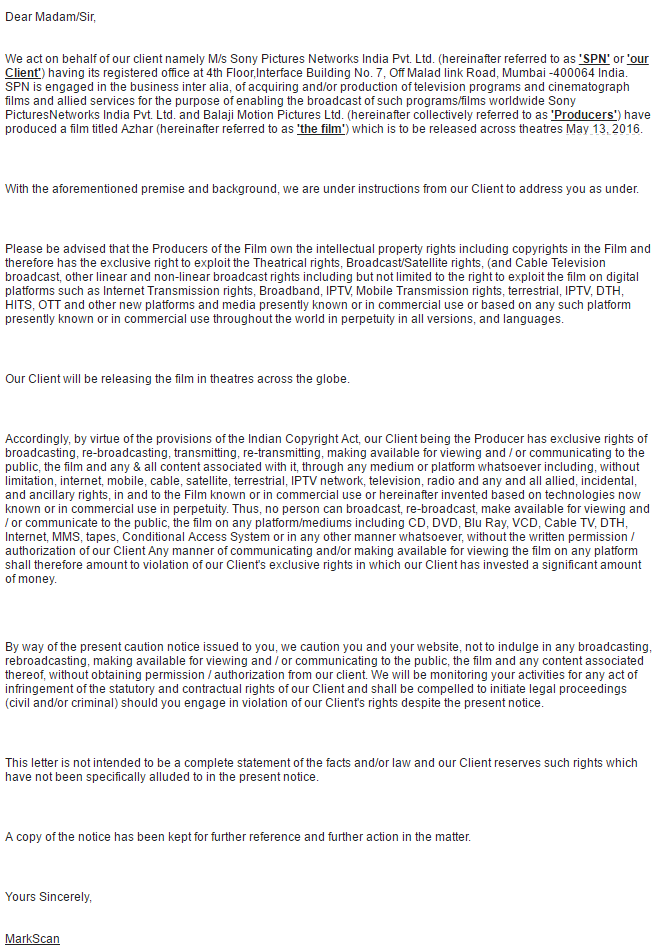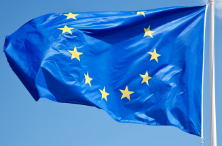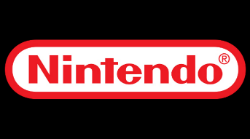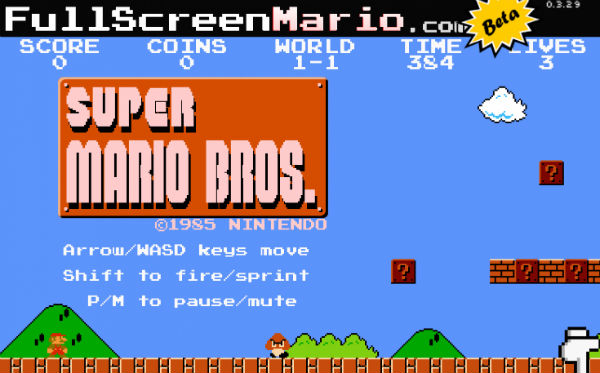Sony Pictures Targets Torrent Sites With Preemptive Takedowns
samedi 14 mai 2016 à 00:22 While it’s not widely publicized, many larger torrent sites regularly remove links to infringing files. This allows copyright holders to somewhat limit the availability of their works on the Internet.
While it’s not widely publicized, many larger torrent sites regularly remove links to infringing files. This allows copyright holders to somewhat limit the availability of their works on the Internet.
Generally speaking, movie studios and other rightsholders hire anti-piracy companies to track down infringing content. These outfits then send takedown notices to the sites in question.
In India, the local Sony Pictures’ representatives are taking a different approach. This week they informed several torrent site operators about their upcoming release, Azhar, which premieres in theaters today.
However, instead of linking to torrents or specific URLs, the notice is a general warning urging site owners to keep the film off their sites. Citing the Indian Copyright Act, the company warns that distributing the film would break the law.
“By way of the present caution notice issued to you, we caution you and your website, not to indulge in any broadcasting, rebroadcasting, making available for viewing and / or communicating to the public, the film and any content associated thereof, without obtaining permission / authorization from our client,” the notice reads.
Sony Pictures Networks‘ anti-piracy partner MarkScan adds that they will keep a close eye on the developments, and warns that civil or criminal lawsuits may follow if the warning is ignored.
“We will be monitoring your activities for any act of infringement of the statutory and contractual rights of our Client and shall be compelled to initiate legal proceedings (civil and/or criminal) should you engage in violation of our Client’s rights despite the present notice,” they write.
While the language may sound intimidating, the torrent site operators we spoke with have no plans to take preemptive action. Besides broad keyword filters, there are few options to prevent users from uploading content that’s not available yet.
At the time of writing we haven’t seen any pirated copies of Azhar on torrent sites, but the soundtrack is widely distributed. Despite the threats, it’s likely that the movie will follow soon after the first releases leak online.

Source: TF, for the latest info on copyright, file-sharing, torrent sites and ANONYMOUS VPN services.
 Following the failed SOPA and PIPA bills, entertainment industry groups have switched their efforts away from legislation and towards voluntary cooperation with various stakeholders.
Following the failed SOPA and PIPA bills, entertainment industry groups have switched their efforts away from legislation and towards voluntary cooperation with various stakeholders.
 Consumers of audio-visual content – video in particular – are often granted access to different libraries of movies and TV shows depending on which country they’re accessing services from.
Consumers of audio-visual content – video in particular – are often granted access to different libraries of movies and TV shows depending on which country they’re accessing services from. Playing old console games through browser-based emulators and spin-offs is a niche pastime of many dedicated gamers.
Playing old console games through browser-based emulators and spin-offs is a niche pastime of many dedicated gamers.
 In 2013, anti-piracy prosecutor Fredrik Ingblad filed a motion targeting two of The Pirate Bay’s most recognizable names, ThePirateBay.se (the site’s main domain) and PirateBay.se (a lesser used alternative).
In 2013, anti-piracy prosecutor Fredrik Ingblad filed a motion targeting two of The Pirate Bay’s most recognizable names, ThePirateBay.se (the site’s main domain) and PirateBay.se (a lesser used alternative).